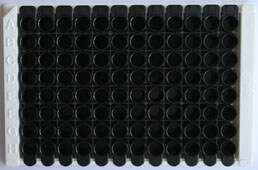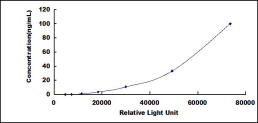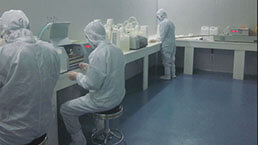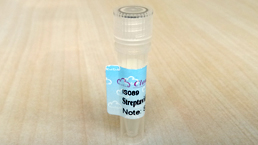Packages (Simulation)

Reagent Preparation

Image (I)
Image (II)
Certificate


CLIA Kit for Collagen Type IV (COL4)
Type-IV Collagen
- Product No.SCA180Hu
- Organism SpeciesHomo sapiens (Human) Same name, Different species.
- Sample TypeSerum, plasma, tissue homogenates and other biological fluids
- Test MethodDouble-antibody Sandwich
- Assay Length2h, 40min
- Detection Range0.14-100ng/mL
- SensitivityThe minimum detectable dose of this kit is typically less than 0.07ng/mL.
- DownloadInstruction Manual
- UOM 48T96T 96T*5 96T*10 96T*100
- FOB
US$ 588
US$ 840
US$ 3780
US$ 7140
US$ 58800
For more details, please contact local distributors!
Specificity
This assay has high sensitivity and excellent specificity for detection of Collagen Type IV (COL4).
No significant cross-reactivity or interference between Collagen Type IV (COL4) and analogues was observed.
Recovery
Matrices listed below were spiked with certain level of recombinant Collagen Type IV (COL4) and the recovery rates were calculated by comparing the measured value to the expected amount of Collagen Type IV (COL4) in samples.
| Matrix | Recovery range (%) | Average(%) |
| serum(n=5) | 81-94 | 90 |
| EDTA plasma(n=5) | 92-101 | 98 |
| heparin plasma(n=5) | 92-105 | 101 |
Precision
Intra-assay Precision (Precision within an assay): 3 samples with low, middle and high level Collagen Type IV (COL4) were tested 20 times on one plate, respectively.
Inter-assay Precision (Precision between assays): 3 samples with low, middle and high level Collagen Type IV (COL4) were tested on 3 different plates, 8 replicates in each plate.
CV(%) = SD/meanX100
Intra-Assay: CV<10%
Inter-Assay: CV<12%
Linearity
The linearity of the kit was assayed by testing samples spiked with appropriate concentration of Collagen Type IV (COL4) and their serial dilutions. The results were demonstrated by the percentage of calculated concentration to the expected.
| Sample | 1:2 | 1:4 | 1:8 | 1:16 |
| serum(n=5) | 89-103% | 80-99% | 98-105% | 95-103% |
| EDTA plasma(n=5) | 84-94% | 88-102% | 94-102% | 78-95% |
| heparin plasma(n=5) | 87-101% | 80-101% | 92-99% | 82-102% |
Stability
The stability of kit is determined by the loss rate of activity. The loss rate of this kit is less than 5% within the expiration date under appropriate storage condition.
To minimize extra influence on the performance, operation procedures and lab conditions, especially room temperature, air humidity, incubator temperature should be strictly controlled. It is also strongly suggested that the whole assay is performed by the same operator from the beginning to the end.
Reagents and materials provided
| Reagents | Quantity | Reagents | Quantity |
| Pre-coated, ready to use 96-well strip plate | 1 | Plate sealer for 96 wells | 4 |
| Standard | 2 | Standard Diluent | 1×20mL |
| Detection Reagent A | 1×120µL | Assay Diluent A | 1×12mL |
| Detection Reagent B | 1×120µL | Assay Diluent B | 1×12mL |
| Substrate A | 1×10mL | Substrate B | 1×2mL |
| Wash Buffer (30 × concentrate) | 1×20mL | Instruction manual | 1 |
Assay procedure summary
1. Prepare all reagents, samples and standards;
2. Add 100µL standard or sample to each well. Incubate 1 hours at 37°C;
3. Aspirate and add 100µL prepared Detection Reagent A. Incubate 1 hour at 37°C;
4. Aspirate and wash 3 times;
5. Add 100µL prepared Detection Reagent B. Incubate 30 minutes at 37°C;
6. Aspirate and wash 5 times;
7. Add 100µL Substrate Solution. Incubate 10 minutes at 37°C;
8. Read RLU value immediately.
GIVEAWAYS
INCREMENT SERVICES
| Magazine | Citations |
| Nature Medicine | Angiotensin-Converting Enzyme 2 Overexpression Remarkably Ameliorated Glomerular Injury in a Rat Model of Diabetic Nephropathy: A Comparison with ACE Inhibition MolMed: 10_11_liu |
| American Journal of Physiology - Renal Physiology | Advanced oxidation protein products induce mesangial cell perturbation through PKC-dependent activation of NADPH oxidase PubMed: 19019916 |
| Journal of Surgical Research | Serum Levels of Matrix Metalloproteinase-2 as a Marker of Intimal Hyperplasia ScienceDirect: S0022480409001942 |
| Stem Cell Research Therapy | Protein synthesis and secretion in human mesenchymal cells derived from bone marrow, adipose tissue and Wharton's jelly Pubmed: 24739658 |
| Molecules. | Identification of compounds from the water soluble extract of Cinnamomum cassia barks and their inhibitory effects against high-glucose-induced mesangial cells. Pubmed: 24013407 |
| Journal of Ethnopharmacology | Bioactive compounds from Cornus officinalis fruits and their effects on diabetic nephropathy ScienceDirect: S0378874114002414 |
| Journal of Clinical and Experimental Hepatology | Protective Effects of Norursodeoxycholic Acid Versus Ursodeoxycholic Acid on Thioacetamide-induced Rat Liver Fibrosis ScienceDirect: S0973688314000073 |
| Life Sci. | Attenuation of renal ischemia/reperfusion injury by a?aí extract preconditioning in a rat model Pubmed:25476829 |
| PLoS One. | Mesenchymal stromal cell proliferation, gene expression and protein production in human platelet-rich plasma-supplemented media Pubmed:Pmc4130592 |
| American Journal fo Reproductive Immunology | Trophoblasts and Decidual Stromal Cells Regulate Decidual NK Cell Functions Via Interaction between Collagen and LAIR-1 Pubmed:24548186 |
| Chem Biol Interact | Camel milk attenuates the biochemical and morphological features of diabetic nephropathy: Inhibition of Smad1 and collagen type IV synthesis PubMed: 25617480 |
| Viral Hepatitis Journal | The Relationship of the Degree of Hepatic Fibrosis with Hyaluronic Acid, Type 4 Collagen, and Procollagen Type 3 N-Terminal Peptide Levels in Patients with Chronic Viral Hepatitis Openview: 8A0B8C97D72C61741371F33508760B75 |
| International Journal of Experimental Pathology | Pathological characterization and morphometric analysis of hepatic lesions in SHRSP5/Dmcr, an experimental non-alcoholic steatohepatitis model, induced by high-fat and high-cholesterol diet doi:10.1111 |
| MOLECULAR AND CLINICAL ONCOLOGY | Clinical significance of serum laminin and typeâIV collagen levels in cutaneous melanoma patients Pubmed:27330797 |
| Am J Transplant. | Key Matrix Proteins Within the Pancreatic Islet Basement Membrane Are Differentially Digested During Human Islet Isolation. pubmed:27456745 |
| Molecular Medicine Reports | Human decidua mesenchymal stem cells regulate decidual natural killer cell function via interactions between collagen and leukocyte‑associated immunoglobulin‑like receptor 1 10.3892:mmr.2017.6921 |
| Clinical Cancer Research | Phase I and biomarker study of plerixafor and bevacizumab in recurrent high-grade glioma Pubmed:29941486 |
| International Journal of Molecular Medicine | Adenovirus‑mediated knockdown of activin A receptor type 2A attenuates immune‑induced hepatic fibrosis in mice and inhibits interleukin‑17‑induced … Pubmed:29620144 |
| Biomedicine & Pharmacotherapy | Corn silk (Zea mays L.), a source of natural antioxidants with α-amylase, α-glucosidase, advanced glycation and diabetic nephropathy inhibitory activities Pubmed: 30530231 |
| Experimental Lung Research | High amplitude stretching of ATII cells and fibroblasts results in profibrotic effects Pubmed: 31290711 |
| Journal of Biological Chemistry | Growth hormone induces Notch1 signaling in podocytes and contributes to proteinuria in diabetic nephropathy Pubmed: 31511328 |
| ECOTOXICOLOGY AND ENVIRONMENTAL SAFETY | Pantoea agglomerans chronic exposure induces epithelial-mesenchymal transition in human lung epithelial cells and mice lungs Pubmed: 32146192 |
| PLoS One | Beneficial impact of cathelicidin on hypersensitivity pneumonitis treatment¡ªIn vivo studies 33999928 |
| Advanced glycation end-products associate with podocytopathy in type II diabetic patients | |
| Biomolecules | Increase in Serum MMP-9 and TIMP-1 Concentrations during Alcohol Intoxication in Adolescents—A Preliminary Study Pubmed:35625637 |
| Catalog No. | Related products for research use of Homo sapiens (Human) Organism species | Applications (RESEARCH USE ONLY!) |
| NPA180Hu01 | Native Collagen Type IV (COL4) | Positive Control; Immunogen; SDS-PAGE; WB. |
| PAA180Hu01 | Polyclonal Antibody to Collagen Type IV (COL4) | WB; IHC; ICC; IP. |
| LAA180Hu71 | Biotin-Linked Polyclonal Antibody to Collagen Type IV (COL4) | WB; IHC; ICC. |
| SEA180Hu | ELISA Kit for Collagen Type IV (COL4) | Enzyme-linked immunosorbent assay for Antigen Detection. |
| HEA180Hu | High Sensitive ELISA Kit for Collagen Type IV (COL4) | Enzyme-linked immunosorbent assay for Antigen Detection. |
| SCA180Hu | CLIA Kit for Collagen Type IV (COL4) | Chemiluminescent immunoassay for Antigen Detection. |
| LMA180Hu | Multiplex Assay Kit for Collagen Type IV (COL4) ,etc. by FLIA (Flow Luminescence Immunoassay) | FLIA Kit for Antigen Detection. |
| KSA180Hu01 | ELISA Kit DIY Materials for Collagen Type IV (COL4) | Main materials for "Do It (ELISA Kit) Yourself". |












